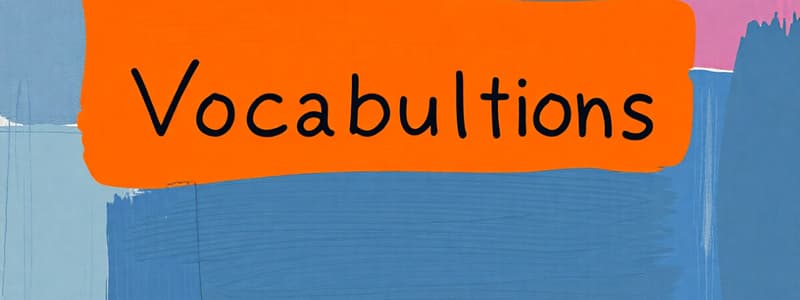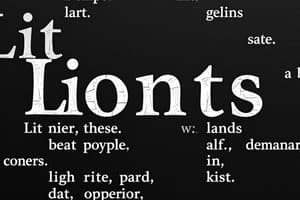Podcast
Questions and Answers
What is the primary meaning of the term 'chore'?
What is the primary meaning of the term 'chore'?
- An enjoyable task
- A formal dance
- A daily domestic task (correct)
- A type of clothing
Which of the following best describes 'circuits' in a geographical context?
Which of the following best describes 'circuits' in a geographical context?
- A division of land
- A natural pathway
- A closed circular line around an area (correct)
- A type of electronic connection
Which of the following terms is synonymous with 'clandestine'?
Which of the following terms is synonymous with 'clandestine'?
- Public
- Secret (correct)
- Open
- Obvious
What does the term 'chronic' primarily refer to in a medical context?
What does the term 'chronic' primarily refer to in a medical context?
What is the meaning of 'circumspect'?
What is the meaning of 'circumspect'?
Which of the following words is an antonym of 'churlish'?
Which of the following words is an antonym of 'churlish'?
What does the term 'cite' imply in a formal context?
What does the term 'cite' imply in a formal context?
What is a likely physical characteristic implied by the term 'ciliated'?
What is a likely physical characteristic implied by the term 'ciliated'?
What does the term 'divest' mean?
What does the term 'divest' mean?
Which word is synonymous with 'doctrine'?
Which word is synonymous with 'doctrine'?
What is a likely meaning of the term 'docile'?
What is a likely meaning of the term 'docile'?
What is the primary action of the verb 'dowse'?
What is the primary action of the verb 'dowse'?
Which of the following best defines 'dogmatism'?
Which of the following best defines 'dogmatism'?
What does the word 'doldrums' refer to?
What does the word 'doldrums' refer to?
The word 'divine' can be associated with which of the following meanings?
The word 'divine' can be associated with which of the following meanings?
Which term is an antonym of 'dogged'?
Which term is an antonym of 'dogged'?
What does the term 'equitable' mean?
What does the term 'equitable' mean?
Which word is synonymous with 'erudite'?
Which word is synonymous with 'erudite'?
Which option best describes the meaning of 'espouse'?
Which option best describes the meaning of 'espouse'?
What is the study of the origins of words referred to as?
What is the study of the origins of words referred to as?
Which word describes something that is difficult to understand and known only to a select few?
Which word describes something that is difficult to understand and known only to a select few?
Which term refers to a state of being separated or alienated?
Which term refers to a state of being separated or alienated?
What does 'equivocate' mean?
What does 'equivocate' mean?
The term 'ethereal' best describes something that is?
The term 'ethereal' best describes something that is?
Flashcards are hidden until you start studying
Study Notes
Choreography
- The art of arranging dance movements and steps. It involves creating a visual representation of dances using written symbols.
Chore
- Refers to daily domestic tasks like cleaning, cooking, and shopping.
- It can also be used to describe any unpleasant or tedious task.
Chortle
- A type of laugh that expresses delight and amusement.
Chuckle
- A quiet type of laugh, often characterized by a soft sound.
Chronic
- Describes a disease or condition that has persisted for a long time.
Chronicle
- A written account of historical events, typically presented in chronological order.
Churlish
- A rude or boorish manner or behavior
- A "churl" is a synonym for a boor or yahoo.
Ciliated
- Having minute hairs, resembling eyelashes.
- "Cilium" (singular) and "cilia" (plural) refer to eyelashes.
Cipher
- A person or thing considered insignificant or worthless.
- Can also refer to a secret code or zero.
Circlet
- A small ring or band made of gold, silver, jewels, or other materials. Worn on the head, arms, or neck for decorative purposes.
Circuitous
- Indirect or roundabout, not straightforward.
Circuit
- A closed circular line or path around an area.
- Often used to refer to a regularly repeated journey from place to place.
Circumlocution
- An indirect and roundabout way of expressing something. It often involves using more words than necessary, particularly when avoiding a direct answer to a difficult question.
Circumscribe
- To limit or confine something physically or conceptually.
- To draw a line around something.
Circumspect
- Acting with caution, prudence, and careful thought.
Circumvent
- To outsmart, avoid, or get around something by being clever or resourceful.
Cistern
- A reservoir or water tank.
Citadel
- A fortress, typically a stronghold within a city.
Cite
- To quote something as evidence or support for an argument.
- To commend someone for bravery in an official record.
Civil
- Relating to citizens or the general public.
- Not related to military or religious matters.
- Courteous and polite in behavior.
- Example: civil ceremony (non-religious marriage), civil strife (disorder among citizens), civil law.
Clairvoyant
- Having the ability to see or know things that are beyond the reach of ordinary senses, often referred to as foresight or fortune-telling.
- Clairvoyance is the noun form of clairvoyant.
Hindsight
- The ability to understand or realize an event's true nature after it has happened.
Clamber
- To climb awkwardly, scrambling with difficulty.
Clamor
- A loud and continuous noise.
- Can also refer to the continuous demands or complaints of many people.
Clandestine
- Secret, kept hidden from public knowledge.
Chaperon
- An older person who accompanies and supervises a young unmarried woman, especially in social settings.
Clangor
- A loud, resounding noise, often associated with the sound of repeated clanging.
Clapper
- The part of a bell that strikes it to produce sound, also known as the "tongue."
Clap
- To strike the palms of the hands together quickly and forcefully, producing a sharp sound.
- Can also be used to mean "come together suddenly with a sharp sound" or "put or send promptly."
- Example: "Diverse" (adj.): variety, dissimilitude, lack of resemblance.
Diversion
- The act of turning aside or changing direction.
- Can also refer to an activity that distracts or amuses.
Divest
- To strip someone of something, such as clothing, rights, or possessions.
- Divestiture or divestment is the noun form.
Divine
- To perceive something intuitively or by supernatural means,
- To foresee or predict the future.
- To dowse for underground water or minerals.
- Divination is the noun form.
Dowse
- To use a divining rod or other tool to search for underground water or minerals.
Divulge
- To reveal a secret or confidential information.
Docile
- Obedient and easily managed, submissive.
Ferocious
- Fierce and violent in nature.
- The noun form is "ferocity."
Docket
- A list of cases scheduled for trial.
- A book where such entries are made.
- A list of things to be done, also known as an agenda.
- A label attached to a package that lists its contents or directions.
Doctrinaire
- Inflexible and unwilling to compromise on matters of doctrine or belief.
- Dogmatic or unyielding in one's views.
- Strongly attached to a doctrine without considering its practical difficulties.
Doctrine
- Teachings or principles, often associated with religion, law, or philosophy.
- A dogma or tenet.
- Doctrinal is the adjective form.
Indoctrinate
- To teach someone a specific set of beliefs, often without allowing questioning or critical thinking.
- Example: indoctrine with mindless anti-communism.
Document
- To provide written evidence for a claim or statement.
- To record something with written documents.
Doddering
- Shaky, infirm, or unsteady due to old age.
Merit
- To deserve something, often recognition or praise. Meritorious is the adjective form, meaning "deserving reward or praise".
Doff
- To take off (usually referring to clothing). The opposite of "don."
Dogged
- Determined and persistent, even in the face of difficulties.
- Stubborn and tenacious in pursuing a goal.
- Example: Inspector Javert's dogged pursuit of Jean Valjean.
Persevere
- To continue steadily despite difficulties or obstacles.
Doggerel
- Poorly written or clumsy verse, often considered trivial or nonsensical.
Dogmatic
- Opinionated and stubborn in holding to one's own beliefs.
- Arbitrary and insistent on the correctness of one's own views.
Doldrums
- A state of low spirits, depression, or listlessness.
- A period of inactivity or stagnation.
- An area of the ocean near the equator with little or no wind, making it difficult for ships to travel.
Blues
- A state of depression or melancholy.
- A style of slow, mournful music, rooted in the blues tradition of African American music.
Dolorous
- Sorrowful or full of grief.
- Dolor is the noun form.
Dolt
- A stupid or slow-witted person.
- Synonymous with "dull."
Domicile
- A home or residence.
- Domiciled is the adjective form, meaning "having one's domicile." (Ex.: He is domiciled in Britain.)
Equine
- Relating to horses or resembling horses.
- Example: equine face.
Equinox
- The time of year when day and night are equal in length.
- The beginning of spring or autumn (vernal or autumnal equinox).
- Equinoctial is the adjective form.
Equipoise
- A state of balance or equilibrium between opposing forces.
Equitable
- Fair and just, treating all people equally and impartially.
- Inequitable is the opposite.
Equity
- Fairness and justice.
- Inequity is the opposite.
Equivocal
- Ambiguous, uncertain, or open to multiple interpretations.
- Can also describe behavior that raises doubts or questions.
- Unequivocal is the opposite.
Equivocate
- To use ambiguous language to deceive or mislead someone.
- To lie or attempt to conceal the truth.
- Equivocation is the noun form.
Erode
- To eat away or wear away gradually by friction or erosion.
- Example: The sea erodes the rocks.
Erotic
- Relating to passionate love or sexual love.
Errant
- Wandering or straying, often in search of adventure or without a fixed destination.
- Example: knight-errant.
- Can also refer to someone who has strayed from proper moral standards.
Erratic
- Odd, unpredictable, or irregular in behavior or movement.
Erroneous
- Mistaken, incorrect, or wrong.
Erudite
- Learned, scholarly, or having a deep knowledge of a particular subject.
- Erudition is the noun form.
Escapade
- A reckless adventure, prank, or act of defiance.
Prank
- A mischievous or playful trick.
Flighty
- (Especially used to describe women's behavior) capricious, impulsive, or prone to sudden changes.
- Often refers to someone changing lovers frequently.
Eschew
- To avoid habitually or deliberately, refuse to do something.
- Example: eschew alcoholic drinks.
Esoteric
- Difficult to understand, known only to a select few.
- Often used for knowledge that is not common or widely shared.
- Esoterica is the noun form.
Espionage
- The act of spying or gathering secret information.
Espouse
- To adopt or support an idea, cause, or belief.
- To marry or take a spouse.
- Espousal is the noun form.
Esteem
- To respect, value, or admire someone or something.
- To judge someone or something.
Estranged
- Separated or alienated from someone or something, especially family or friends.
- Estranged can also be used as a verb, meaning "to alienate people in a family"
- Estrangement is the noun form.
Ethereal
- Like a spirit or fairy, unreal, heavenly, or extraordinarily delicate.
- Can also refer to something that is unusually refined.
- Example: She has ethereal beauty.
- Ether refers to the upper air (origin of ethereal).
Airy
- Relating to air, lofty, or immaterial.
- Can also describe something light and delicate or something that lacks substance or solidity.
Ethnic
- Relating to particular races or ethnic groups.
Ethnology
- The study of humankind and its races, cultures, and societies.
- Related to anthropology.
Ethos
- The underlying character or spirit of a person, group, or culture.
- The shared beliefs, values, and attitudes that define a particular community or organization.
Etymology
- The study of the origins and development of words.
- The branch of linguistics that deals with word formation and history.
Eugenic
- Relating to the improvement of the human race, especially through controlled breeding.
- Often associated with controversial theories about race and heredity.
- The noun form is eugenics.
Studying That Suits You
Use AI to generate personalized quizzes and flashcards to suit your learning preferences.




